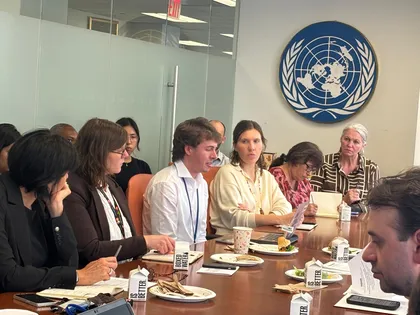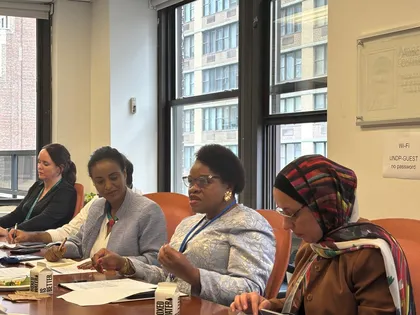IATI holds Roundtable at UNGA 80 to highlight essential role of transparency
At UNGA 80, the International Aid Transparency Initiative (IATI) convened a roundtable to highlight the essential role of transparency and open data.
The meeting “Transparency 2030: Roundtable on Open Data for Enhancing Accountability, Effectiveness and Trust in the Development System” engaged a packed room of governments, multilaterals, civil society, and philanthropic organisations.

UNGA 80 Roundtable: Transparency 2030 event held on Wednesday 25 September 2025.
IATI’s Executive Director, Yemesrach Workie, presented the initiative’s strategic direction for 2030. Ms. Workie stressed that transparency must help governments and citizens make better decisions in a time of scarce resources. “Transparency is not just a normative principle. It is a practical tool to drive effectiveness in development cooperation, to coordinate better, build trust, and make limited resources go as far as they can”.

Yemesrach Workie, IATI Executive Director (left) Ambassador Dr. Agnes Mary Chimbiri-Molande, Permanent Representative of Malawi to the United Nations (middle), (Zainab Al-Azzawi, UNICEF and IATI Governing Board)
The event heard remarks from Ambassador Dr. Agnes Mary Chimbiri-Molande, Permanent Representative of Malawi to the United Nations. Her Excellency said: “Transparency means knowing who is doing what, where, how, and with what resources. Good data is key to effective development”.
The Ambassador welcomed IATI’s proposed strategic directions for 2030, in particular the focus on technological development and capturing the contributions of emerging donors.
“Good data is key to effective development” — Ambassador Dr. Agnes Mary Chimbiri-Molande, Permanent Representative of Malawi to the United Nations
Gary Forster, CEO of Publish What You Fund spoke about the priorities for the transparency agenda, building on the initiative’s strong foundation: “We have an extraordinary resource in the IATI dataset and community. But we must address the gaps — on impact, on development finance institutions, on climate finance — or there’s a genuine risk we miss our goals and do not know why.”
Perspectives from Participants
Representatives from across the development and humanitarian community shared their experiences with IATI data:
- UNICEF emphasised IATI’s uniqueness as a global, multi-actor platform, citing its use in responding to ODA cuts and in national planning processes.
- Germany (BMZ) highlighted that its transparency portal relies fully on IATI data for communicating with parliamentarians, media, and citizens, stressing priorities of usability, timeliness, interoperability, and AI.
- UNFPA underlined IATI’s role in reducing duplicative reporting and strengthening accuracy and visibility of data as part of rebuilding trust in multilateralism.
- The Gates Foundation stressed the importance of defending and diversifying development finance, and called for more data on philanthropic flows and South-South cooperation.
Emerging Issues
Discussions also explored a wide set of broader challenges and opportunities, with participants sharing their data needs and priorities. Key themes included:
- Closing transparency gaps: Participants highlighted that impact data remains inconsistent, DFIs lack disclosure, and climate finance figures often cannot be traced.
- Private sector and DFIs: Participants noted that balancing commercial confidentiality with accountability remains a key concern.
- Interoperability: There were calls for harmonisation with other reporting systems. Participants discussed the need for more understanding of the differences between data offered through IATI and the OECD CRS.
- South-South and triangular cooperation: Participants stressed the importance of capturing these growing forms of cooperation.
IATI thanks all representatives who contributed their insights at the UNGA 80 roundtable. We look forward to working together as these perspectives help shape IATI’s future and strengthen our collective efforts to advance transparency in development cooperation.